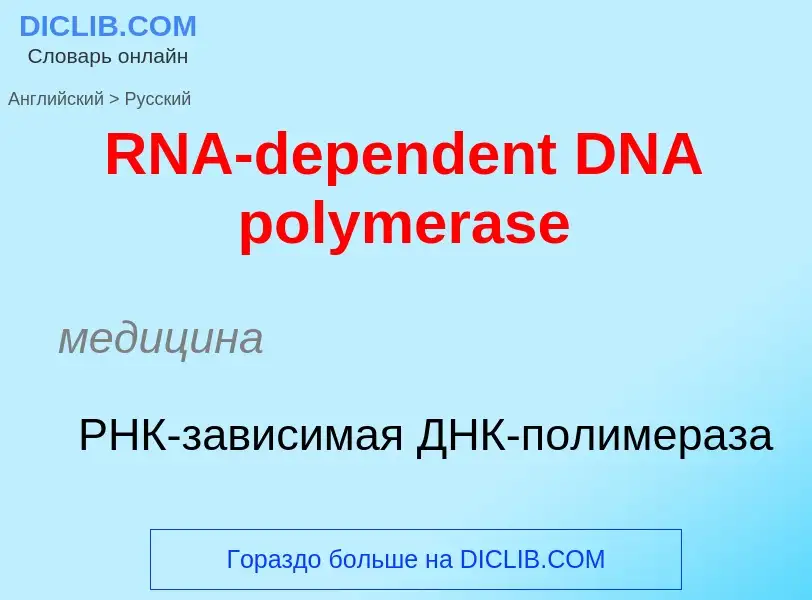Vertaling en analyse van woorden door kunstmatige intelligentie ChatGPT
Op deze pagina kunt u een gedetailleerde analyse krijgen van een woord of zin, geproduceerd met behulp van de beste kunstmatige intelligentietechnologie tot nu toe:
- hoe het woord wordt gebruikt
- gebruiksfrequentie
- het wordt vaker gebruikt in mondelinge of schriftelijke toespraken
- opties voor woordvertaling
- Gebruiksvoorbeelden (meerdere zinnen met vertaling)
- etymologie
RNA-dependent DNA polymerase - vertaling naar russisch
медицина
РНК-зависимая ДНК-полимераза
общая лексика
репликация РНК
медицина
ДНК-зависимая ДНК-полимераза
Wikipedia

In molecular biology, RNA polymerase (abbreviated RNAP or RNApol), or more specifically DNA-directed/dependent RNA polymerase (DdRP), is an enzyme that catalyzes the chemical reactions that synthesize RNA from a DNA template.
Using the enzyme helicase, RNAP locally opens the double-stranded DNA so that one strand of the exposed nucleotides can be used as a template for the synthesis of RNA, a process called transcription. A transcription factor and its associated transcription mediator complex must be attached to a DNA binding site called a promoter region before RNAP can initiate the DNA unwinding at that position. RNAP not only initiates RNA transcription, it also guides the nucleotides into position, facilitates attachment and elongation, has intrinsic proofreading and replacement capabilities, and termination recognition capability. In eukaryotes, RNAP can build chains as long as 2.4 million nucleotides.
RNAP produces RNA that, functionally, is either for protein coding, i.e. messenger RNA (mRNA); or non-coding (so-called "RNA genes"). At least four functional types of RNA genes exist:
- Transfer RNA (tRNA)
- Transfers specific amino acids to growing polypeptide chains at the ribosomal site of protein synthesis during translation;
- Ribosomal RNA (rRNA)
- Incorporates into ribosomes;
- Micro RNA (miRNA)
- Regulates gene activity; and, RNA silencing
- Catalytic RNA (ribozyme)
- Functions as an enzymatically active RNA molecule.
RNA polymerase is essential to life, and is found in all living organisms and many viruses. Depending on the organism, a RNA polymerase can be a protein complex (multi-subunit RNAP) or only consist of one subunit (single-subunit RNAP, ssRNAP), each representing an independent lineage. The former is found in bacteria, archaea, and eukaryotes alike, sharing a similar core structure and mechanism. The latter is found in phages as well as eukaryotic chloroplasts and mitochondria, and is related to modern DNA polymerases. Eukaryotic and archaeal RNAPs have more subunits than bacterial ones do, and are controlled differently.
Bacteria and archaea only have one RNA polymerase. Eukaryotes have multiple types of nuclear RNAP, each responsible for synthesis of a distinct subset of RNA:





![RNA strand]], which can be seen branching off from the DNA. "Begin" indicates the [[3′ end]] of the DNA, where RNAP initiates transcription; "End" indicates the [[5′ end]], where the longer RNA molecules are completely transcribed. RNA strand]], which can be seen branching off from the DNA. "Begin" indicates the [[3′ end]] of the DNA, where RNAP initiates transcription; "End" indicates the [[5′ end]], where the longer RNA molecules are completely transcribed.](https://commons.wikimedia.org/wiki/Special:FilePath/Transcription label en.jpg?width=200)




